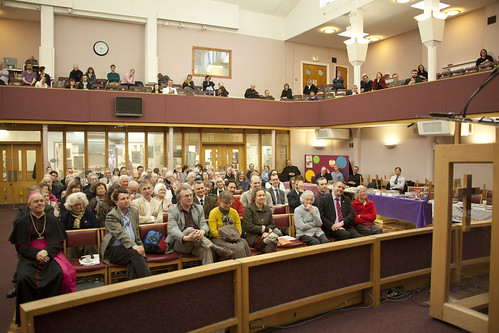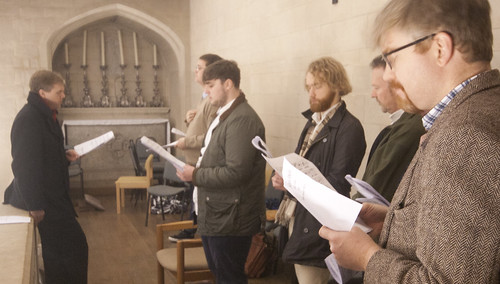Chairman's Blog
LMS Online Conference on Saturday
 |
| A real-world conference organised by the LMS in pre-covid days |
Online Latin Course in August and September
This year the Latin Mass Society's long-standing annual residential Latin Course has had to be cancelled due to the Coronavirus epidemic. We are delighted therefore to be able to announce a new initiative by an independent language teacher, Matthew Spencer, for the online teaching of Christian Latin over August and September.
Mr Spencer has previously been teaching ancient languages to university students preparing for further studies, and he would now like to apply his skills to teaching Latin. The course’s focus on the distinctive, later period of Latin of writers such as Augustine and Boethius will make this course of particular interest and usefulness to Catholics and all those interested in discovering the rich world of Christian Latin.
He plans to teach very small groups once or twice a week, some aimed at 'Beginners' and others at those with some previous experience of Latin.
Conservatism after Bostock
Pagans attack Statue of St Boniface in Devon
Archdiocese of Munich in bizarre stunt with monstrance
My latest on LifeSite.
This festival is about showing people on the spot that God is in the middle of us, in the middle of the world, at all times. The idea arose to photograph the monstrance, i.e. this vessel for showing the body of Christ, in different places of everyday life. The oral project received broad approval from the other sixty or so pastors.
Western Civilisation has got to go!
My latest on LifeSite.
Read the whole thing.
J.K. Rowling faces down the mob
My latest on LifeSite
Read the whole thing.
Guild of St Clare sponsorship for RSN Embroidery Certificate
 |
| Crewel work completed by our first sponsored student, James Sharpe |
Cross-posted from the Guild of St Clare blog.
In 2019 the Guild of St Clare made the first award under its Sponsorship Scheme to help a student through the Certificate Course at the Royal School of Needlework. Our sponsored student has made good progress, and as he enters his second year of part-time study, we can start sponsoring a second.
The deadline is 22nd June.
The RSN Certificate Course takes between one and four years, depending on how intensively students wish to do it. Its great flexibility makes it ideal for those who can only spare limited time, or whose availability fluctuates over the year. The Certificate gives its graduates a thorough grounding in a range of traditional hand-embroidery skills, skills for which the RSN is renowned, and which its experts apply to historic restoration projects and important commissions.
Sponsored students will be able to reclaim half the cost of their tuition days, up to a maximum of £2,000 a year (September 1st to September 1st), subject to satisfactory progress in the Certificate course, and their attendance at least one of the Guild’s two annual Sewing Retreats. Students at the RSN have to pay for tuition days when they book them; they would be reimbursed at that point. Progress will be monitored by reference to the successful completion of each module, and the reports which are provided by RSN tutors on each piece of work.
More information, and how to apply, can be found here.
Communion and Covid: from the Una Voce Federation
 A press release from the FIUV. PDF version here.
A press release from the FIUV. PDF version here.Singing and the Coronavirus
 |
| The Schola Abelis, Oxford's Gregorian Chant Schola, shrouded in incence in the rather roomy 'tribune' (choir loft) at Blackfiars back in 2018. |
Some potentially good news: there is now some evidence that the idea that singing is a specially dangerous activity in the context of the pandemic is false.
At the outbreak of the pandemic very little relevant research existed, but some has now been done: this paper, awaiting its peer-review, is at least a hopeful sign.
One of its key points is that singing does not spread air--and therefore anything carried by air such as viruses riding on droplets of water--very far:
The experiments clearly show that air is only set in motion in the immediate vicinity of the mouth when singing. In the case of the professional singer, the experiments showed that at a distance of around 0.5 m, almost no air movement can be detected, regardless of how loud the sound was and what pitch was sung. It is therefore unlikely that the virus could spread beyond this limit via the air flow created during singing. Amateur musicians who do not use the diaphragmatic breathing most commonly used by professionals when singing, but rather the natural chest breathing, do not get beyond this range either. By singing a very loud and long sequence of the same tone at about 2 Hz, a slightly wider spread of air movement could be achieved.
From: "Singing in choirs and making music with wind instruments ‒ Is that safe during the SARS-CoV-2 pandemic?" by Christian J. Kähler (Prof. Dr.) and Rainer Hain (Dr.) Institute of Fluid Mechanics and Aerodynamics, University of the Bundeswehr Munich, Werner-Heisenberg-Weg 39, 85577 Neubiberg, Germany.
The hope is that the issue with choirs will be social distancing, contrary to the cramped conditions many choirs frequently have to endure both in rehearsal and performance, but not the act of singing itself.

